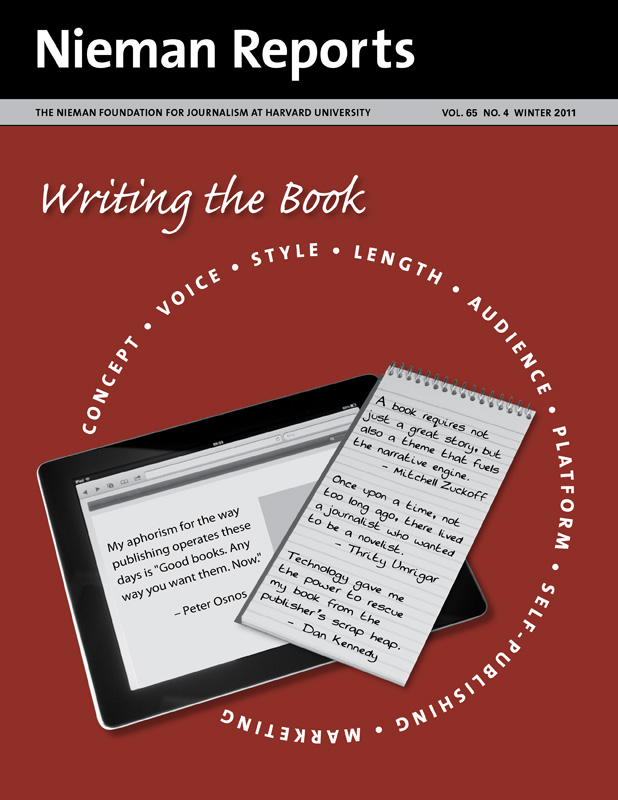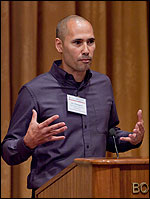A.C. Thompson, whose reporting from post-Katrina New Orleans revealed hate crimes and police brutality, is the winner of the 2011 I.F. Stone Medal for Journalistic Independence.
A reporter with ProPublica, Thompson spent a year and a half investigating two cases involving racially charged attacks that occurred in the weeks after Hurricane Katrina made landfall in 2005. As a result of his reporting in 2007 and 2008, federal prosecutors opened cases against a private citizen and five police officers.
In his acceptance speech at Boston University (BU) in October, Thompson said the prominent story line in the media after Katrina was that poor blacks were wreaking havoc in the already ravaged city. He did not find this to be the case when he went there.
“Some of the worst criminals were wearing uniforms,” he said. “The police force was the biggest gang in town.”
This became most apparent in the case of Henry Glover. Beginning with only a vague report alleging police misconduct, Thompson reconstructed the final hours of Glover’s life, when he was shot, beaten and left to die in the back of a car that was set on fire to destroy his remains.
That the burned-out car was still sitting on the levee three years later was just one of the many signs that Thompson was entering a different world when he arrived in New Orleans. He admitted that when he arrived, he “was like Bambi … just a naïve child.”
“This is a crazy place,” he recalled thinking. “You kill people, burn up their bodies, and just leave it there. … In other places, you at least try to hide the evidence.”
His other major investigation involved Donnell Herrington, a black man who survived two close-range shotgun blasts while he and two companions were walking through a white neighborhood to reach a Coast Guard evacuation site.
Thompson tracked down the shooter, a white man named Roland Bourgeois, Jr., and uncovered a general air of impunity for white-on-black violence.
These stories are emblematic of Thompson’s interest in marginalized figures suffering at the hands of authority, an interest rooted in his time teaching writing to juvenile offenders before he became a journalist.
“I saw kids who seemed deeply traumatized, many of them nearly illiterate,” he said. “Their parents had failed them, their schools had failed them, and now the correctional facility was failing them.”
That experience followed him to the San Francisco Bay Guardian, the alternative weekly that hired him in 1998. There, editor Tim Redmond, one of his most important mentors, taught him the skills of investigative journalism. Redmond told him that understanding how government works would “open up nodes of information or data or facts,” Thompson said. “It’s buried in a dusty file cabinet in some government office … it’s not online, and you can’t Google it.”
Established in 2008, the I.F. Stone Medal honors the life of investigative journalism I.F. Stone. The award, administered by the Nieman Foundation and its Nieman Watchdog Project, is presented annually to a journalist whose work captures the spirit of independence, integrity, and courage that characterized I.F. Stone’s Weekly, published from 1953 to 1971.
This year’s selection committee, chaired by John R. (Rick) MacArthur, president and publisher of Harper’s Magazine, also included Robert Kaiser, associate editor and senior correspondent for The Washington Post, and Patricia O’Brien, NF ’74, a journalist, novelist and author. The group made their selection from recommendations presented by distinguished journalists who, by design, remain anonymous and serve for just one year.
The person who nominated Thompson for the award wrote that Thompson is “intelligent, measured, courageous and resourceful, displaying a skepticism of authority and a non-sentimental concern for the underdog and a readiness to dig deeply into public records and interviews to uncover instances of injustice—in short, a perfect candidate for an I.F. Stone Medal.”
Documentation was a driving force for Thompson in New Orleans. He waded through almost a thousand autopsy reports from the weeks after Katrina, reports that he had to sue the state to obtain. Being awash in so much death did have an effect on him, Thompson acknowledged during a question and answer session moderated by Maggie Mulvihill, NF ’05, director of the New England Center for Investigative Reporting at BU.
“Journalism in America is not a dangerous profession,” he said. “But when you do stories about life and death … the emotional toll is more dangerous than anything else.”
Speaking to that toll, he shared one of the most gruesome aspects of the Glover case: While his charred skull was visible in crime scene photos, it was never cataloged with the rest of his remains and has yet to be found.
“I’m still wondering about Glover’s skull and where it went,” he said. “Whether anyone will ever return it to his family.”




